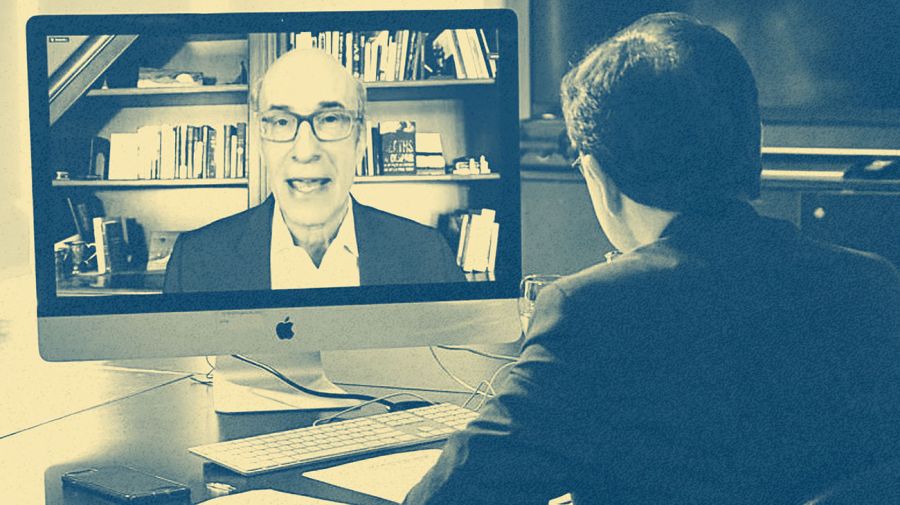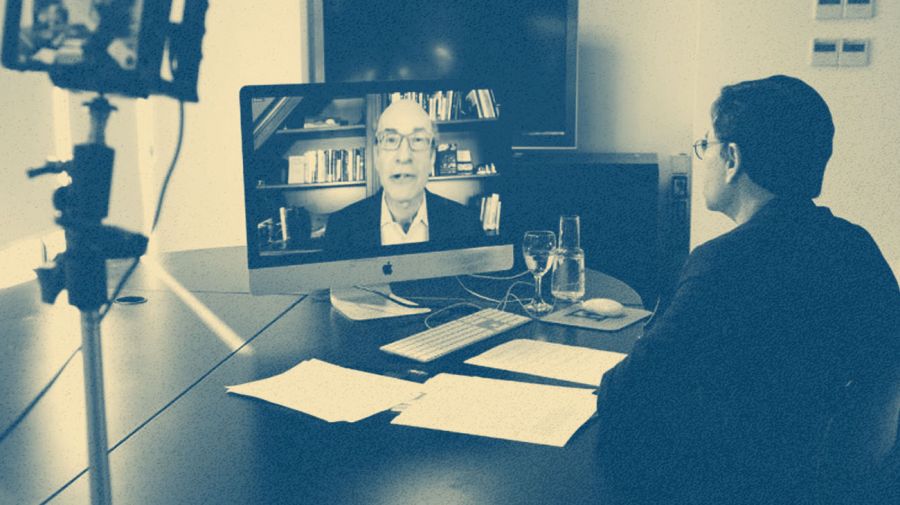Leading US economist Kenneth Rogoff is one of the theorists most academically opposed to the ideas of Joseph Stiglitz. Nevertheless, he agrees with Stiglitz, Economy Minister Martín Guzmán's mentor, on the need for creditors to accept a major write-off on debt payments for countries like Argentina.
An international grandmaster of chess, author of multiple books and an expert on financial crises, exchange rates and central bank independence, Rogoff served as the International Monetary Fund's chief economist from 2001 to 2003. He is the Thomas D. Cabot Professor of Public Policy and Professor of Economics at Harvard University.
Unlike some other leading thinkers, Rogoff fears the West could be facing the worst recession in modern history, and he argues that rich countries must provide massive aid to poorer nations as the pandemic ravages the global economy.
Could this really be the largest economic depression in history, even worse than the one in 1929?
Well, it's possible. I mean, the tide has been the steepest ever, the rise in unemployment. And it's hard to compare modern numbers with numbers from back then. I think it also has to be said that the world as a whole is much wealthier than it was in the Great Depression. But it compares to the Great Depression. I think if you go back to 1870, it already shapes up as the second-worst recession, the depression that the world has faced. The World Bank recently said that, so did the OECD. But it's ahead of us. I think it could still be as bad or even worse for many countries than the Great Depression.
The marginal contribution of the effects of the financial aggregates is decreasing. When interest rates are already at zero, could new forms of quantitative easing not generate more relief?
Well, I don't know what country you're talking about, but certainly in the United States and in Europe. Absolutely. The interest rate in 2009, 2010, was four and a half percent on 30-year debt. Now it's one and a half percent.
So, of course, there's the possibility of doing more. On the other hand, you know, you can't do it forever. Still, it's not a free lunch. Even the United States, which now accounts for roughly half of all the market debt, market government debt, among the rich countries, even for the United States. There will come a time when markets will start resisting. But that hasn't come yet. I've been very much in favour of the stimulus that's been done, as I was in 2009. And I feel more needs to be done. And I don't think it'll be a problem for a while, but it's not a free lunch there. Of course, there are long-term effects on growth.
The response to the last global crisis was to lower interest rates aggressively. This pushed up asset prices, and many believe it created bubbles and systemic risk. How much of this crisis is due to excessively loose monetary policies in the past?
Oh, I think this is a natural catastrophe, the health crisis. I won't say that the whole world was free and clear and that there weren't pockets of problems. But we've been hit by the worst natural disaster, at least, since the Spanish Flu in 1918. So this was going to hurt any country no matter how healthy it was, no matter how little debt it had.
The last global crisis was that of 2008 to 2009. How is this coronavirus crisis different from that of mortgages?
Well, it's different in a lot of ways. OK, start with the fact that in 2008, 2009, that was an advanced economy crisis. We here in the United States, maybe in Europe, call it the "global financial crisis." But the truth of the matter is that it was a rich country financial crisis. Emerging markets had the leverage, and were actually in a fairly strong position before. And then when China grew very quickly, it put up commodity prices. On the whole, it was a good era for emerging markets, certainly the first several years after the global financial crisis, except for maybe the very beginning.
This is different. This is a crisis hitting the entire world. The pandemic is causing the same problems – it's causing deaths. Countries are having to find ways to try to prevent the pandemic from spreading. Locking down, all these dramatic measures, and everyone is having to do this. It's very global. When you have to shut the economy down like this, of course, it reveals fissures in the financial system. Of course, it reveals weaknesses. I think governments have been trying very hard to cover these up. But if the virus continues, right now, I would say: I don't know what's going to happen.
The epidemiologists that I listen to say it's going to continue going around the world. There are going to be second waves. It will get better. But it's a long time before it goes away. And there are going to be businesses that just aren't viable anymore, countries that rely on tourism, a collapse in oil prices, natural resources.
We are still in the beginning of this. We're nowhere near the end of it. I hope we got lucky and it turns out the virus weakens, [that] it turns out that we come up with good treatments, it turns out that we come up with a vaccine that works and is robust quickly. I hope so, but it's really much too soon to say. It's still a very difficult period for most of the world.
When will the economic and social costs of closing everything be exponentially greater and unmanageable than the spread of coronavirus?
That is a very tough question. It's not just an economic question. It's philosophical, moral, sociological. And I think everyone is trying to grapple with this question. What are the trade-offs?
One of my most respected colleagues, Alberto Alesina, great political economist, the likely Nobel Prize winner, very sadly passed away a couple of weeks ago with a heart attack that, without giving all the details, I do not believe that it necessarily would have happened if he had felt comfortable going to a hospital. And I think there are many people in that situation – cardiologists in the United States, at least in the Boston area, are reporting a big drop in people coming in, reporting strokes, heart attacks. But they don't think anything's changed. They just think people are afraid to go to the hospital.
You can go on to cancer treatment, vaccinations. There are many health costs, suicide, all sorts of mental health problems, children not getting educated. It's a very serious problem. These drastic lockdowns such as we've done in Boston, New York has done the same, and of course, it has been done in large parts of Argentina, it's very costly.
It's a difficult trade-off. I think people will be arguing about this for a long time. I don't think there's a clear answer. There are certainly a number of economists who are arguing you could isolate certain sectors. You could emphasise certain kinds of social distancing more. But I don't think anyone knows right now.
Developed nations like the United States and the European Union nations have the capacity to spend aggressively to limit the impact of the crisis, but poor nations like Argentina and the Latin American region in general don't have those capacities. How much worse will this crisis be for poor nations?
I'm very concerned about this. I'm very concerned that the Covid-19 crisis, which really began in China, in the advanced economies, will turn into a major humanitarian crisis, possibly not just debt crises, but food crises, all kinds of problems. And it's very difficult for the poorer countries, for poorer people to handle this.
I've been writing about this and arguing that there needs to be massive aid from rich countries to poor countries. This is a once-in-100-years event we had in Washington. We're seeing billions or trillions of dollars to be spent internally, virtually nothing on foreign aid. I think that's going to be necessary. And even more importantly, we need to help countries grow out of it – we can't have trade wars and trade barriers that prevent countries from trying to dig their way out.
It is a very dangerous and difficult situation. It still is unfolding. We don't know where it's going, but I'm very concerned how this is going to unfold. A billion people who live in the advanced economies – Europe, the United States, Japan – they have enormous capacity to deal with it, and China has shown great flexibility also. But maybe the other five billion people who are living in emerging markets and developing economies are extremely vulnerable, it is a very dangerous moment. And I don't think that there are easy answers. But I wish the advanced countries would look at what is unfolding in this humanitarian crisis and think twice about globalisation and think harder about finding ways for debt relief and humanitarian aid.

The printing of money that central banks around the world are making, could it generate a return of inflation in the future?
Who knows? When interest rates are zero, issuing debt overnight, central bank debt, which has a zero-interest rate... looks like printing money. But it doesn't necessarily have inflationary effects.
I like to make an analogy in this crisis to the movie The Wizard of Oz, the 1939 movie with Judy Garland. I don't know how many of your viewers have seen it. It's a classic children's movie in the United States, all families watch it. Dorothy, the heroine, goes up in a tornado at the beginning and it spins around and she doesn't know where she's going to land – that's how I feel about the economy at the moment. I don't know where we're going to land. We may have deflation for a long time, but it's certainly possible that at the end of all this, we'll have much higher inflation. We'll have interest rates go up. Markets don't think so. I don't think that's necessarily likely. But I think anyone who tells you they know where we're going to be in five years is kidding themselves.
And aside from the economic factors. What about the political factors? We are seeing huge political changes that might have taken place over a decade in the United States unfold in a matter of months. We're, of course, having civil unrest associated with the Black Lives Matter movement, which I think hits on some very important issues which need to be paid attention to. Again, there are all kinds of businesses which are going to go bankrupt. We have the Federal Reserve guaranteeing bonds and debts from practically everything in the economy. Right now, it's fine. But where will we be in five years? I don't know. To be clear, I think governments that have the fiscal capacity and the monetary capacity to react are doing the right thing to do so. But where we end up, I just don't know.
Is the fall in the price of oil a symptom of a syndrome where the loss of value of one sector drags the other and the other, spiralling downward?
Well, if we compare today to the 1930s for emerging markets, there are many similarities. So one is a collapse in trade – trade fell by at least 30 percent during the Great Depression of the 1930s.
It may well have fallen 20 to 25 percent in the early days of the Covid crisis, and it may stay lower as firms are worried about global supply chains, As countries are worried about food security, medical security and other things. But there's no question that the recession really hits at commodity exporters. Food prices may stay high, but I think for many other commodities, metals and especially oil, it's just an epic collapse. It's certainly at the cutting edge, the leading edge of many of the bankruptcies we're seeing.
Countries like Ecuador are experiencing problems, as well as Angola, South Africa. It hurts a number of countries in Latin America. The oil prices falling so much has been very problematic. That's sad, they may go up at the end of this because nobody's investing, and if the global economy rebounds, oil prices really a year from now could be quite a bit higher. It's hard to say, but at the moment it's a major problem. And to directly answer your question, of course, if a country is very dependent on oil revenues, natural resource revenues, and they're not coming in, it hits everything else in the economy.
Are we observing a new economic paradigm where liberalism has been replaced by a sort of new Keynesianism, as countries spend aggressively and even the EU relaxes deficit and debt limitations?
Well, this is more like a war than a recession. And I think the most conservative models of government debt spending would have you raise spending and deficits dramatically when you're facing a huge natural catastrophe or a war.
So there has been this idea that, well, this is Keynesianism. This is war economics. Certainly the low interest rates, you know, help promote this. I think it's a question of what's going to come after this, after the pandemic – will we see deficits remain high? Will deficit spending be used to address political problems, social inequities? I would favour raising taxes on the rich and having more transfers as a more sustainable way to pay for a more equal society. I worry that countries will not slow down in their appetite for debt. I'm talking about Europe and the United States. At the end of this, we're talking two or three years from now, maybe even more. But I'm worried it's not going to slow down. And then you asked me about inflation and interest rates and yes, they would come back and it would be very uncomfortable dealing with it. But again, I don't know. Certainly in the early days, we're looking at wartime finance, wartime economics. We're not looking at Keynesian economics.
Will the coronavirus crisis allow a return in similar ways to the welfare state and to greater state intervention on the markets?
So the history of whenever a big crisis happens, and the state has to respond aggressively, is that it remains larger afterwards. So I think we can expect that, looking especially at the United States, where it's most acute in the advanced economies, the problem of income inequality and wealth inequality is profound. There were very strong movements to try to reverse this.
Yes, the election of Donald Trump slowed that down. But I think if the Democrats take the presidency, the Senate and the House in November – which is a distinct possibility – nothing is certain. I think we would see a big increase in taxes. I think that makes sense to try to push back that inequality. So what I'm trying to say is that it was coming. And like so many things with the Covid-19 crisis, a trend that was happening slowly, a decade's worth of change, has taken place in a couple of months. And I think that's what we'll see here. I think it's a healthy thing. But again, it's one thing to talk about redistributing income, and I am, I think we need to do that, and certainly strengthening the social safety net, many other aspects of the welfare state; And it's another thing to talk about abandoning capitalism and markets, which I think would be a mistake. It would be throwing the baby out with the bathwater.
Will consumption and production habits change permanently after Covid-19?
You ask another difficult question. I think it's going to take a while. For example, when I listen to virologists talk about what a vaccine is going to do, they say "we're really confident, we think there's a really good chance that by the end of 2021 everyone will have a vaccine that is 50 or 60 percent effective,” not 100 percent effective. And I don't think people are going to change all their habits right away.
I think there'll be very big effects on the tourism industry, on travel. I travel a lot myself as an international economist, or at least I used to! I don't know when that's going to happen again because I think the quarantines and closed borders are going to only open up very gradually. I suspect restaurants may not, you know, have the same model. It's not all bad. I think there's some changes that are taking place which are good and again, move a trend faster. One example is education. I'm a university professor. I think there has been capacity for a long time to do more online, more efficiently, to reach more people, be more egalitarian. And I think it's becoming clearer that it can work pretty well. This has forced people to be creative and try different paradigms.
So it's not all negative. Not all these changes are going to be for the worse. But I do think there's going to be a lot of restructuring of economies. They're going to look different. And the governments have to be careful to try to protect jobs, to protect people, but not to prevent these changes from gradually unfolding. We are not going to wake up in the same world a couple of years from now. It will be different and hopefully not all in a bad way. Hopefully some good ways. It remains to be seen.
With the new leadership of Kristalina Georgeva, and since the coronavirus crisis, is there a different IMF? One that is more socially committed?
Well, I think the new managing director has the right instincts and is the right person for the time. Her expertise comes from the World Bank, which is more of an aid agency, whereas the IMF is more of a lender.
But we're in a situation where really we need to be talking about how to help countries. We need to be talking about grants. We need to be talking about trying to restructure all kinds of debts. And I've been very impressed with her in the meetings I've seen, what she's putting forth.
I don't think this is all a personal thing. I also think you see it on the board of the IMF and the G20. But that said, a lot of the same forces are still there. The private lenders still want to get paid. The Chinese have become very big lenders around the world; China is actually the biggest official lender. It's bigger than the IMF and the World Bank and all the other advanced economies combined. And we have yet to see how China will behave. I think they, too, will need to think about writing down some of their debts. But I think the IMF has said a lot of the right things. [But] It doesn't have this power that the G20 has. The G20 is the one that has the power to really rewrite the rules, the IMF is more technical assistance. But I've certainly felt that they've said some very sensible things.
Nobel laureate Joseph Stiglitz, who warned of a wave of defaults, has asked for major debt forgiveness for poorer nations. Can you comment on what Stiglitz said? And do you think that it is necessary to pardon debt from poor countries?
Well, I strongly agree with Professor Stiglitz on this. In fact, I think [fellow US economist] Carmen Reinhart and I wrote about this a few weeks ago, arguing that this is really big and we need to have major debt relief. We talked about a debt moratorium and I signed a letter that Professor Stiglitz and Carmen Reinhart wrote on this topic. So this isn't normal. This is a full-scale natural catastrophe.
And I think there is money going to be lost, creditors will need to accept that. We can't go through seven years in debt negotiations and all kinds of problems to try to achieve that. I think it's important that we do something to try to facilitate this because it's very hard without them. If the creditors think they're going to get paid – and I'm particularly talking about the private creditors – they need to be given strong incentives, it needs to be made clear that they're not going to be bailed out. But indeed, I strongly agree.
I have to say, if you read my writings, I supported write-downs for debt in the 2009 crisis. I wrote about writing down debts for subprime homeowners. I discussed that with the president. I wrote about writing down the debt of Southern European countries, I've talked about that widely. It didn't happen. I think that was a big mistake, i think had we done that, we would have done better politically and the whole global economy would have gone better. The same is true here. If things continue the way it looks and we're still in the early stages, I think the outcome will be pretty similar to the 1930s. And you don't want this to drag on for years and years. You want to bring it to your relatively rapid resolution ...
I very much agree with Professor Stiglitz that this is a moment where countries need to spend their resources on their health sectors, on helping people who are unable to work, on helping very poor people. It's a natural catastrophe. And I think creditors have to recognise that money has been lost, including their money. And the whole hit cannot be taken by countries.
You previously criticised Joseph Stiglitz and wrote him an open letter defending the International Monetary Fund and the World Bank. Almost two decades have passed since then. Now Stiglitz has warned of a wave of defaults and called for debt relief for the poorest nations. Can you substantiate your permanent differences with Stiglitz and what things you could agree on nowadays?
Well, the open letter was actually a debate we had held at the World Bank. Stiglitz, of course, was the World Bank’s chief economist. He argued that when emerging market debt countries face a debt crisis, they should spend more. I made the case that that's fine if they find somebody is willing to give them the money. But often, when a country is faced with a debt crisis, no-one wants to lend them money. No-one wants to give them new money. And if they were spending a lot more than their income and suddenly they can't borrow, it doesn't even matter if they aren't repaying their debt, if they got a debt moratorium, they're still forced by their belts. So I didn't think that was a recipe that would work for most emerging markets most of the time. There may be exceptions.
Similarly, he argued that when an emerging market faces an exchange rate crisis, it should cut its interest rates, when often that just makes the exchange rate crisis worse. So I wasn't necessarily disagreeing with his view that poor countries should do the best they can. I am very much in favour of debt restructurings. I'm very much in favour of debt moratoria where it's possible. But I don't think that the tools that advanced countries have are necessarily available to emerging markets.

US Senator Elizabeth Warren has proposed a tax on ultra-millionaires (the 75,000 richest American households), an annual amount equivalent to two percent of the wealth that exceeds US$50 million dollars and three percent when it exceeds US$1 billion. To reduce inequality, are you in favour of a progressive consumption tax with a significant exemption, so that lower income families do not pay anything??
First of all, I want to say that Senator Warren is a friend of mine and I strongly support many things and I'm very sympathetic with the idea of having a wealth tax.
It's hard to understand why we need to have people with US$100 billion. I do think there might be easier ways to do it. We barely have an inheritance tax in the United States, We should put it back. We have lowered the tax on capital gains. We should sharply raise it. All of these things would be like a wealth tax. If you raise capital gains taxes, it's going to lower stock market values. The government's going to get benefits from that.
I strongly favour more progressive taxation. I think many economists are attacking the idea of the consumption tax because it's very simple and has a very, very big exemption in the United States. I certainly favour ideas which are simple and market-friendly. Again, I'm very sympathetic to what Senator Warren is trying to do. Putting in a wealth tax is not so easy. It's not that easy to measure wealth. It's very hard to figure out inheritances and wealth.
But if they do put in a wealth tax after Senator Biden becomes president, it's not something that I'm going to oppose fiercely. I certainly understand the incentive behind it, correcting for past inequities. It's not something that I'm going to strongly oppose. I do think there are other ideas that would be more effective. But I certainly get why so many people are in favour of Senator Warren's proposal.
Today in Argentina, a special tax on the 12,000 richest people is being discussed as a contribution to alleviate the coronavirus crisis.
I don't know the Argentine context as well as I know the US context. I don't know the other taxes, [but] I understand the emotional desire to do that.
I don't know how easy it is to impose a wealth tax versus collecting more taxes from inheritance capital gains, preventing people from taking their money out of the country. I just don't know the Argentine context well enough. I think I understand the US context. I don't think a wealth tax would raise nearly as much money as some of its proponents think. But on the other hand, it might be something that needs to be done politically before other things can be done.
I have to say, I don't know the Argentine context well enough to compare. Obviously, the country is buried in debt, and counting on taxes could make up a very large source of money for solving any major problem in governance in Argentina – you know, finding ways to bring it on for providing a social safety net. Incentives are a form that would help stabilise the economy and strengthen growth in the long run.
Thomas Piketty proposes a strong inheritance tax as a way to improve inequitable income distribution. Would you agree?
Well, he had proposed a global tax on people among the rich countries, and I certainly agree with the idea that we need more redistribution. I strongly agree. However, I found his book very odd, his famous book from 2014. He argues ‘Capitalism failed, capitalism created inequality.’ Well, that's only if you don't care about the six billion people that are helping economies. Capitalism did generate a disaster among a billion or so people in rich countries, but it raised hundreds of millions, probably billions of people in the world out of poverty. And one of the things that concerns me is that after this, we not only have to deal with inequality within the United States, within Europe...
We are going to be deglobalised. We're going to put up controls around our borders, which make it harder for everyone else. Which takes the last 40 years of progress, have lifted so many people out of poverty, and puts it all in reverse. And I understand that it's difficult but I think we have to think of all citizens of the world equally.
We’ve got to end this tradition of thinking that the middle income and lower middle income, and the rich countries, which are among the 10 or 15 percent richest people in the world, are somehow special and the other six million people we shouldn't worry about. I see much too much of that. I would like to see much more attention paid to, for example, creating a World Carbon Bank that helps share technology and resources to improve the environment. I would like to see the World Bank have more grants and less aid. I would like to see a lot of the same political ferment that you see within the United States and within some of the rich countries, extended to other citizens of the world. Everyone should be counted the same.
Is the influence of the United States in the decisions of the International Monetary Fund decisive?
Oh, boy, do I agree with that. So we have a world that was created after the 1940s, after World War II, when emerging markets were small, and in 1980, the emerging markets accounted for, depending on how you weigh things, 20 percent of world GDP. And now they are 40 to 60 percent ...
There's no question that Europe and the United States have excessive power in the World Bank. And this should be reweighted and I think it should begin with that the next head of the International Monetary Fund should not be from Europe – every time the person has been from Europe. The next head of the World Bank should not be from the United States – every time it's been an American. Those would be very important changes. The country which needs to step up the most if we're to make changes is actually China. China has been offered bigger shares in the voting and so far it's been reluctant. And I think it comes from the fact that China is still feeling its way out as a global power. It has not entirely matured as a global power to earn that respect.
So we certainly need to see continued changes. I mean, the current managing director of the International Monetary Fund's very good. And they've had Christine Lagarde, I thought she was very good. But the next person should be from someplace other than Europe, absolutely. And the United States should not get to choose from which side of the world.
How do you think this coronavirus crisis will affect this future balance of power between China and the United States?
Well, in many things, Coronavirus has had the effect of condensing a decade of changes into a much shorter period. And certainly, now in the early days, it looks like China will come out ahead. The United States has not handled the coronavirus well. The United States has not handled the crisis well, as you sure know.
It is too soon to say, but in the 2008 to 2009 financial crisis, the US caused it. And yet the US came out stronger than ever out of that crisis – the dollar rules the world. Even though the US caused the financial crisis more than anyone else, I think it's fair to say that the coronavirus came out of China, that, you know, it could have come from anywhere but it came from China and they might come out of this stronger.
I don't know, again, we're in the early days. The United States is not handling things well so far. But, you know, with this we can say that Americans, you know, are always trying to do the right thing after they have tried everything else. We're certainly in the phase of first trying everything else.
Professor, thank you very much for your time. It was great having you with us.
It was my pleasure.

















Comments